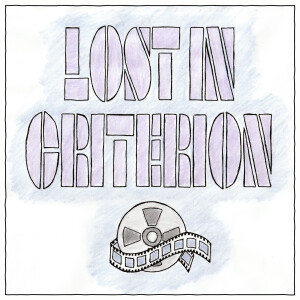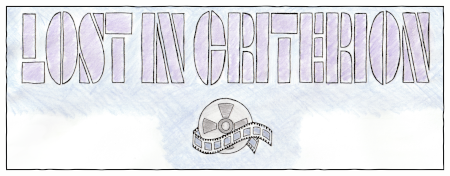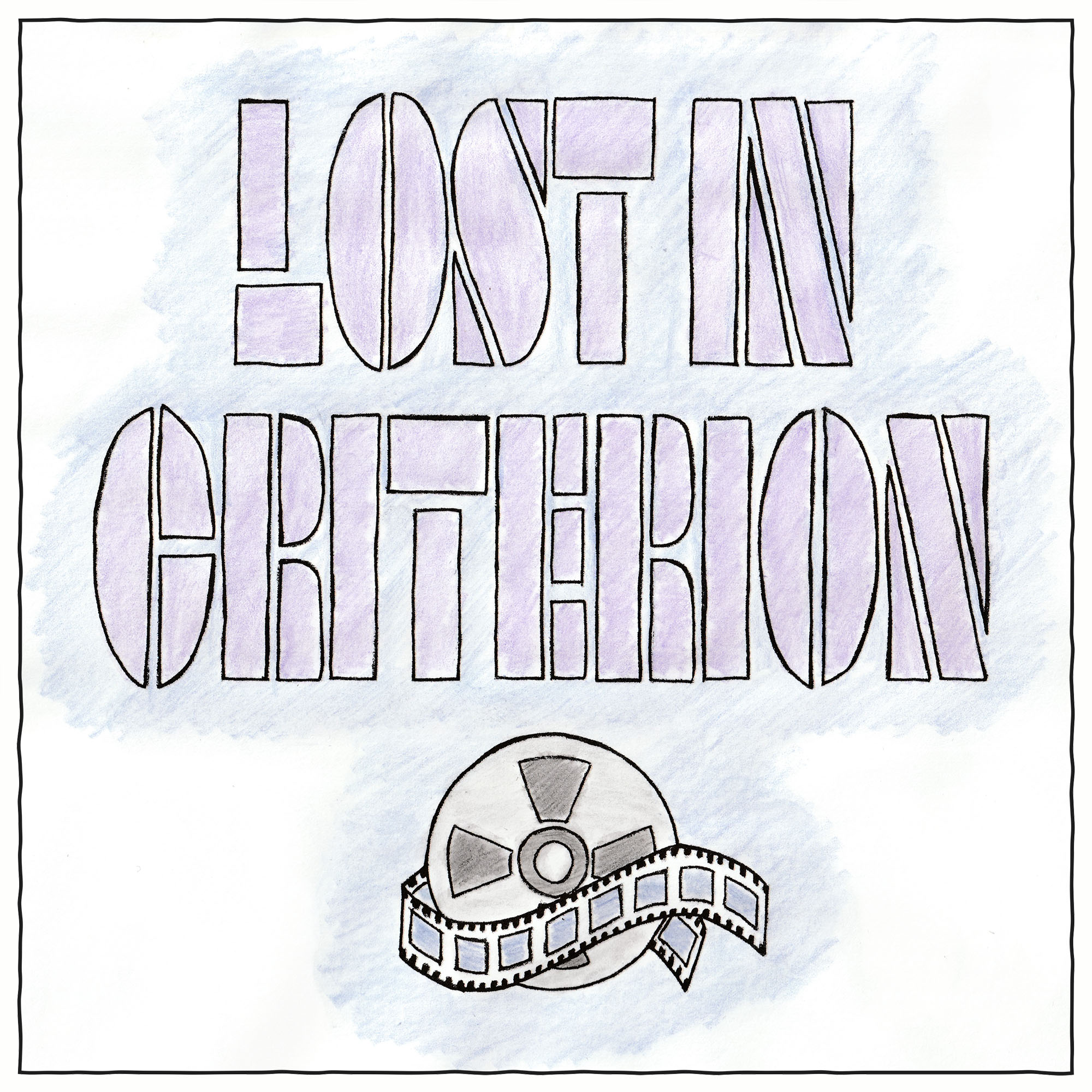Episodes

Friday Aug 01, 2014
Spine 84: Good Morning
Friday Aug 01, 2014
Friday Aug 01, 2014
Ozu's 1959 comedy Good Morning is about two young brothers who go on a silence strike until their parents agree to buy a television. It's also a pretty great window into suburban life in Japan in the Sixties. That combines to stand in a pretty stark contrast to the other Japanese films we've watched so far.

Saturday Jul 26, 2014
Spine 83: The Harder They Come
Saturday Jul 26, 2014
Saturday Jul 26, 2014
I think it's safe to say that Pat and I are outside the originally intended target audience of Perry Henzell's 1972 Jamaican gangster film The Harder They Come, but then we're outside the originally intended target audience for a lot of the movies we've watched and loved through the course of this project.

Saturday Jul 19, 2014
Spine 82: Hamlet
Saturday Jul 19, 2014
Saturday Jul 19, 2014
We've seen Olivier's nationalistic take on Shakespeare in Henry V, now we get to watch him channel German expressionism in Hamlet.

Friday Jul 11, 2014
Spine 81: Variety Lights
Friday Jul 11, 2014
Friday Jul 11, 2014
Federico Fellini's directorial debut, though co-directed with Italian great Alberto Lattuada, 1950's Variety Lights is as entertaining as any of Fellini's later work, if not quite as crazy as some of it. Still full of the crazy characters that fill his movie universes. Bittersweet to say the least, but a great film.

Thursday Jul 03, 2014
Spine 80: The Element of Crime
Thursday Jul 03, 2014
Thursday Jul 03, 2014
A rare treat on this week's Lost in Criterion: a film Pat loves and Adam just can't get into. Lars von Trier's feature-length debut The Element of Crime (1984) is a dystopian film so noir-like that it's more like a noir reduction, boiled down until it is thick with rain and contrast. People like it! Adam is not one of them.

Friday Jun 27, 2014
Spine 79: W. C. Fields - Six Short Films
Friday Jun 27, 2014
Friday Jun 27, 2014
We get another serving of the misanthropic drunk. The Golf Specialist (Monte Brice, 1930), The Pharmacist (Arthur Ripley, 1933), The Fatal Glass of Beer (Clyde Bruckman, 1933), The Barber Shop (Arthur Ripley, 1933), The Dentist (Leslie Pearce, 1932), and the silent Pool Sharks (Edwin Middleton, 1915). While some are better and more memorable than others, I think Pat and I enjoyed each much more than we liked The Bank Dick. The less time we spend with W. C. Fields the more we enjoy him.

Friday Jun 20, 2014
Spine 78: The Bank Dick
Friday Jun 20, 2014
Friday Jun 20, 2014
There's only one truly good scene in The Bank Dick, but fortunately it's almost the entire last act.

Friday Jun 13, 2014
Spine 77: And God Created Woman
Friday Jun 13, 2014
Friday Jun 13, 2014
This week we're watching Roger Vadim direct his then wife Brigitte Bardot in the festival of slut-shaming and misogyny that is And God Created Woman.

Saturday Jun 07, 2014
Spine 76: Brief Encounter
Saturday Jun 07, 2014
Saturday Jun 07, 2014
David Lean's 1945 adaptation of a Noel Coward play brings a great film, if you can get past the fact that it's about the emotional struggles of the bourgeois. I kid! Pat and I both loved Brief Encounter. It's a perfectly crafted story of an affair that leaves us emotionally drained and loving it.

Friday May 30, 2014
Spine 75: Chasing Amy
Friday May 30, 2014
Friday May 30, 2014
Chasing Amy is the story of a man who falls in love with a lesbian and is a terrible person. It doesn't hold up to time, but maybe it was still important at some point.

Friday May 23, 2014
Spine 74: Vagabond
Friday May 23, 2014
Friday May 23, 2014
Pat and I actually understand Agnes Varda this week.

Friday May 16, 2014
Spine 73: Cleo from 5 to 7
Friday May 16, 2014
Friday May 16, 2014
In this episode Pat gets annoyed by the main character's angst, and I spend as much energy as I can trying to get him to care. We have more Agnes Varda coming up in the Collection, including next week's Vagabond, and well deserved, too, considering she pretty much started the French New Wave. Hopefully Pat can get into the others.

Friday May 09, 2014
Spine 72: Le Million
Friday May 09, 2014
Friday May 09, 2014
In this week's episode we watch a French musical comedy and discuss the metaphorical value of Pat's underwear. Le Million (1931) is director Rene Clair's second sound film, a medium he at first regarded as "an unnatural creation" apparently believing that sound would do nothing but diminish the quality of story telling on the big screen, an opinion that I can not imagine anyone actually having ever.

Friday May 02, 2014
Spine 71: The Magic Flute
Friday May 02, 2014
Friday May 02, 2014
Ingmar Bergman's 1975 adaptation of the classic Mozart comedic opera is, as Pat repeatedly says in these week's episode, "wonderful!"

Friday Apr 25, 2014
Spine 70: The Last Temptation of Christ
Friday Apr 25, 2014
Friday Apr 25, 2014
This is a highly controversial film to say the least, and still one that doesn't come up positively in conversation's about Jesus films in conservative circles. A Christianity Today article on the top 10 Jesus films even lists Pasolini's The Gospel According to St. Matthew - a film in which Jesus is a brooding, angry revolutionary made by a Marxist, atheist – while only making a passive negative comment about the “heresy” that is The Last Temptation.

Friday Apr 18, 2014
Spine 69: Testament of Orpheus
Friday Apr 18, 2014
Friday Apr 18, 2014
We hit up our last Jean Cocteau film this week to finish off his trilogy of artistic non-statements with the 1959 swan song Testament of Orpheus. Pat and I are so done with Cocteau and his insistence that nothing he does has meaning even while he forces metaphor and symbolism into every nook and cranny of his work. This one features Cocteau himself as protagonist being berated by supernatural beings for asking "Why?"

Friday Apr 11, 2014
Spine 68: Orpheus
Friday Apr 11, 2014
Friday Apr 11, 2014
We finally find a Cocteau film we can sit through.

Friday Apr 04, 2014
Spine 67: The Blood of a Poet
Friday Apr 04, 2014
Friday Apr 04, 2014
Jean Cocteau's exploration of art leaves Lost in Criterion with feelings.

Friday Mar 28, 2014
Spine 65: Rushmore
Friday Mar 28, 2014
Friday Mar 28, 2014
We're joined by a myriad of guests, old and new, to talk about our first (but certainly not last) excursion into the world(s?) of Wes Anderson: Rushmore.

Friday Mar 21, 2014
Spine 64: The Third Man
Friday Mar 21, 2014
Friday Mar 21, 2014
I owned this movie for a long time. I could watch this movie every day and not grow tired of it. And yet still, viewing it to talk about this week brought fresh eyes and new observations: things I'd never noticed; things I feel kind of stupid for never noticing. Which I suppose is the sign of a true classic. Always something new to discover.

Friday Mar 14, 2014
Spine 63: Carnival of Souls
Friday Mar 14, 2014
Friday Mar 14, 2014
Herk Harvey made educational films. Herk Harvey made an indie horror film in 1962. Herk Harvey had an uneven skillset.

Friday Mar 07, 2014
Spine 62: The Passion of Joan of Arc
Friday Mar 07, 2014
Friday Mar 07, 2014
Carl Theo. Dreyer's direction, and Maria Falconetti's performance combine for one of the greatest cinematic experiences in history.

Friday Feb 28, 2014
Spine 61: Monty Python's Life of Brian
Friday Feb 28, 2014
Friday Feb 28, 2014
Lost in Criterion gets lost in religious controversy (and it won't be the last time) with Monty Python's Life of Brian

Friday Feb 21, 2014
Spine 60: Autumn Sonata
Friday Feb 21, 2014
Friday Feb 21, 2014
Ingmar Bergman directs Ingrid Bergman in a heart-wrenching character study about a bad mother.

Friday Feb 14, 2014
Spine 59: The Night Porter
Friday Feb 14, 2014
Friday Feb 14, 2014
I mean, at least Salo had a point I could grasp.

